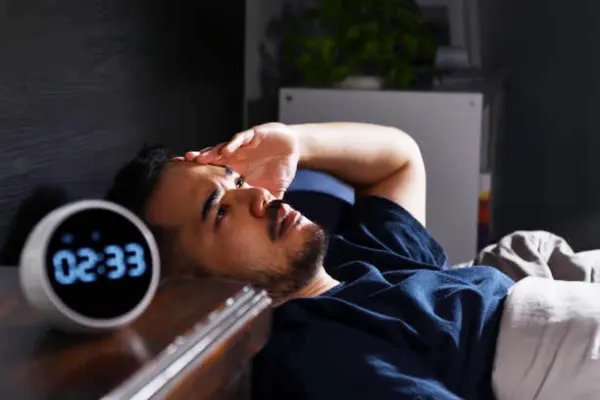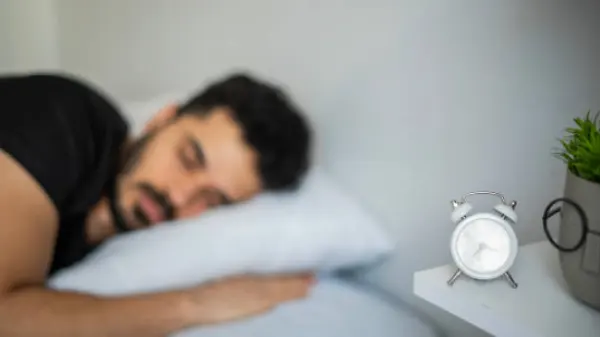When you experience sleep problems, understanding the common causes can illuminate factors that might interfere with restful sleep.
Various factors can contribute to sleep disorders. Recognizing them is the first step toward finding effective solutions.
Physical factors like chronic pain, respiratory problems, and environmental influences such as noise and uncomfortable bedding can disrupt your sleep. Other things can also interrupt your sleep besides these causes.
Let’s look deeper into what’s stealing your precious sleep and how you can fix it. We’ll suggest ways to help you snooze and feel better overall.
Common Causes of Sleep Disorders With Solution
There are a lot of reasons you might be having trouble sleeping. The category of causes can be summed up as follows:
- Physical factors
- Psychiatric disorders
- Environmental factors
- Shift work and jet lag
- Genetics
- Aging
Let’s look at the causes in more detail.
1. Physical Factors
Physical factors like allergies, hormonal changes, and chronic pain can disrupt sleep and contribute to the development of sleep disorders.
Having chronic pain conditions like arthritis or fibromyalgia can make it hard to sleep. One option is to buy codeine phosphate 30 mg, a pain relief medication that can help manage pain and improve sleep quality.
Its pain-relieving effects can help you fall and stay asleep more easily. But always talk to your health professional before taking this.
Allergies, especially those related to respiratory issues, can cause snoring or breathing difficulties that interrupt sleep
The changes in hormones during pregnancy, menopause, and menstruation can also affect sleep.
Understanding how these physical factors impact your sleep can help you identify potential solutions and improve sleep quality. Consult a healthcare professional if you’re struggling with any of these physical issues affecting your sleep.
2. Psychiatric Disorders
Mental health conditions, such as depression and anxiety, can often disrupt sleep patterns and lead to insomnia.
These psychiatric disorders affect how your brain functions and can cause changes in your mood, thoughts, and behaviors that interfere with quality sleep.
For instance, people with depression may experience difficulty falling asleep or staying asleep due to persistent sadness or hopelessness.
Similarly, anxious individuals may have racing thoughts or worries that keep them awake at night. Also, post-traumatic stress disorder (PTSD) is known to cause nightmares and flashbacks that disrupt sleep cycles.
Untreated mental health issues can lead to chronic insomnia, aggravating depression, and anxiety symptoms.
Therefore, seeking professional help from a mental health provider is essential for managing these disorders and improving overall sleep quality.
3. Environmental factors
You may not realize it, but your sleep environment can greatly affect how well you rest at night.
External factors like noise, light, temperature, and an uncomfortable bed or pillow can all disrupt your sleep patterns. To create a more conducive sleep environment, you can take several steps.
Keep the room cool and dark, use earplugs or white noise machines to block unwanted sounds, and invest in comfortable bedding and pillows.
Also, it is beneficial to limit your exposure to electronics before bedtime. These simple changes might help you sleep better and feel better.
4. Shift Work and Jet Lag
Working night shifts or traveling across time zones can seriously disrupt your body’s natural sleep schedule. As a result, you may need more energy and focus throughout the day.
If you work night shifts, you may struggle with insomnia, experience daytime fatigue, and notice decreased cognitive function.
Similarly, when traveling to a new time zone, you may encounter difficulties falling or staying asleep. Because of that, you feel exhausted all day long.
It’s recommended to maintain consistent sleep times as much as possible to manage these issues. When you need to stay up late, expose yourself to bright light.
Taking short naps can be helpful for shift workers or travelers trying to adjust their sleep schedules.
5. Genetics
Genetics may also play a role in sleep disorders. Some sleep disorders like narcolepsy can run in families. If someone in your family has a sleep disorder, you may be more likely to develop one.
While genetics isn’t the sole factor contributing to sleep disorders, discussing it with your healthcare provider is important if you’re experiencing symptoms.
Considering and exploring the role of genetics can provide valuable insights into your condition and guide appropriate treatment options.
6. Aging
As you age, your sleep patterns and architecture undergo changes that can impact the quality of your rest. These changes may include decreased deep sleep, increased light sleep, and more fragmented and interrupted sleep.
You may also experience difficulty falling asleep, which medical conditions like chronic pain or respiratory problems can influence.
A healthcare professional can help you determine what’s causing your sleep disturbances and develop strategies for improving your sleep.
You should also consider lifestyle factors such as alcohol consumption, caffeine consumption, and irregular schedules as you age.
Can sleeping disorders be cured?
You can treat and manage sleep disorders effectively, improving your sleep and well-being. Treating sleep disorders in various ways is possible, but no one-size-fits-all solution exists. You should consult a healthcare professional to guide you through the treatment process.
Treatment for sleep disorders typically involves a combination of lifestyle changes, therapy, and medication.
Lifestyle changes include establishing good sleep hygiene, creating a calming bedtime routine, and ensuring a comfortable sleep environment.
Therapy, such as cognitive-behavioral therapy for insomnia (CBT-I), focuses on underlying factors contributing to sleep problems.
You can get medication to help regulate your sleep patterns in certain situations. Always take medication under the supervision of a healthcare professional who can assess your needs and prescribe the right medication.
If he prescribed it, you can buy sleeping pills online from reputable sources or a local pharmacy. You need to ensure the online pharmacy is legit and safe since buying medication from unauthorized sources is dangerous.
How long do sleep disorders last?
The duration of sleep disorders can vary depending on the specific type and individual circumstances.
Stress or changes in schedule or environment can trigger short-term insomnia that lasts a few days or weeks.
The other type of insomnia is chronic insomnia, which lasts for more than three months without any explanation.
What is a healthy sleep schedule?
A healthy sleep schedule involves getting at least 7 hours of quality sleep every night and maintaining a consistent sleep and wake schedule.
This means going to bed and waking up at the same time every day, even on weekends, to assist your body in sync with its natural sleep-wake cycle.
Sleep routines are linked to better sleep quality, reduced daytime sleepiness, improved overall well-being, and decreased risk of sleep disorders.
Therefore, it is crucial to prioritize healthy sleep habits as a fundamental aspect of overall health and well-being.
Don’t Let Sleep Disorders Affect Your Health: Seek Help Today
Sleep disorders are a common issue that can affect anyone at any age. Sleep disorders’ most common causes include stress, anxiety, depression, medical conditions, and poor lifestyle habits.
But, most sleep disorders are treatable with proper diagnosis and treatment. You should seek professional help if you suspect that you may have a sleep disorder.
A qualified healthcare provider can help identify the underlying cause of your symptoms and recommend appropriate treatment options.
Besides that, sleep hygiene practices like sticking to a consistent bedtime routine and avoiding excessive caffeine and alcohol before bed can help you sleep better.
If you’re having trouble sleeping, seek assistance without delay. Getting restful, revitalizing sleep is imperative to maintaining good health.





